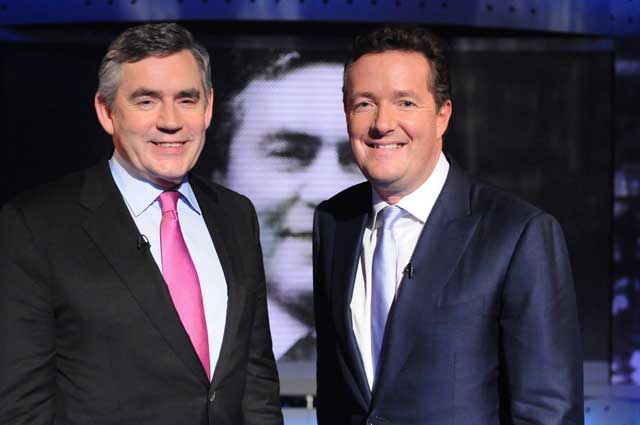Boyd Tonkin: Secret passions of an author at Number 10
The Week In Books

I accuse Gordon Brown of concealing his true nature and colluding in a culture of denial about his personality. Consider the following list of books, published between 1975 and 2008: The Red Paper on Scotland; Maxton: the biography; Courage: Eight Portraits; Moving Britain Forward; Wartime Courage. In almost any other civilised country, a prime minister with a shelf-ful of non-trivial works to his credit would crow about it in a TV interview. Not so in Britain, where the crass philistinism of the political class makes a fake taste for the Arctic Monkeys a safer admission than a real one for history and poetry. So our most literary leader since Winston Churchill acts up for Piers Morgan as a pint-swilling lad who, after his departure, wants to do charity work. No doubt he will, but it's inconceivable that he will not also settle down to write more books. In prime-time Britain, that love still dare not speak its name.
I have heard the prime minister talking with eloquence and commitment about his life as a reader and writer (with Sebastian Faulks, at the London Book Fair). As Chancellor, he helped to secure central funding for the visionary BookStart programme, which gives packs of books to babies and so helps incubate a similar enthusiasm for the future. Now it seems as if such passion may be whispered to insiders, but must be kept at all costs from the hoi polloi. What a steep price in self-betrayal thoughtful public figures pay for our knuckle-dragging pseudo-populism.
This matters, because the sector to which the PM made a direct contribution will need a voice in the coming election. Questions of cultural value aside, the publishing business in Britain turns over £4 billion or so per year. As an export industry, it earns around £1 billion annually from overseas sales. Just at the moment, publishers, authors, booksellers and readers face a cluster of challenges that deserve a place on the campaign agenda.
They may not gain it, in part because anything to do with "the arts" rates for party bigwigs somewhere beneath the shape of market vegetables. Still, we should call for answers soon. Will the parties resist any push from Brussels to remove VAT zero-rating on books? Will they take a less supine stance than at present towards the disputed "Google Settlement" and the wider rights grab by digital giants against authors' copyrights? Will they propose serious steps to revitalise town centres in a way that nurtures specialist retailers such as independent bookshops?
Will they cajole or even compel local authorities to keep branch libraries open and invest in books? Will they follow US law to forbid discounting practices of the kind that now favour chain-store monopolists? Will they make it easier for authors to visit schools and other public places without being treated as potential child abusers?
Will they at least safeguard the tiny slivers of public cultural funding that go towards boosting those key areas of literature where the market can often fail? (Full disclosure time: the Independent Foreign Fiction Prize has flourished thanks to stalwart support from Arts Council England.) And will they dodge the looming train-wreck of the 2012 Cultural Olympiad by making it an arena for excellence rather than a tacky overgrown village fête – for instance, by staging a top-flight international festival of literature and science that celebrates centuries of creative cross-pollination between London (and Britain) and cultures around the world?
And so on... Voters who care about such things may be more likely to float than most. By themselves, readers (and writers) can't hang a parliament, or even swing a seat. They should take courage, though, when they ask candidates to make a bookish stand. When JK Rowling appears with the PM, one side of the pair lends some of a vast reserve of lustre, esteem and affection to the other. And the giver isn't the undercover historian who also serves as MP for Kirkcaldy and Cowdenbeath.
P.S.Virginia Woolf wrote unforgettably about the need for women writers to secure a room of one's own in order to allow their gifts to breathe. The Hosking Houses Trust meets that requirement in the most solid - but picturesque - form. Since 2001, the Trust has given bursaries of varying lengths to established women authors over the age of 40. Recipients enjoy a stipend and lodging at Church Cottage (built 1700; Grade II listed) in the village of Clifford Chambers, near Stratford-upon-Avon. Recent residents have included Elizabeth Speller, Louise Foxcroft and Sarah Burton. It is, above all, a grant of time and peace to write: "There are no duties and pets are welcome." Applications for this year must be submitted by 12 April; more details on the procedure from www.hoskinghouses.co.uk, or call 01789 262924.
b.tonkin@independent.co.uk
Join our commenting forum
Join thought-provoking conversations, follow other Independent readers and see their replies
Comments
Bookmark popover
Removed from bookmarks